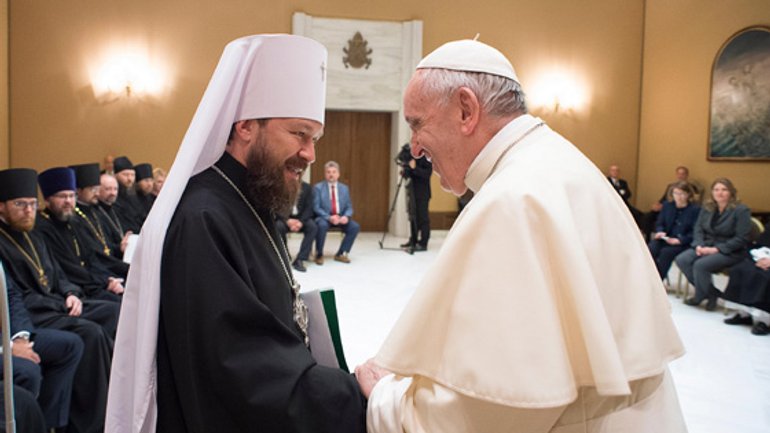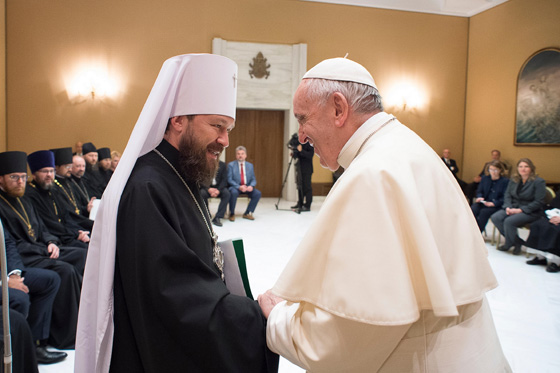All roads lead to Rome. Thoughts following the meeting between the Pope and Metropolitan Hilarion

Rome certainly is the universal See of the Church, even if some do not admit this outright or unequivocally. All roads lead to Rome, even for those who think that they go opposite direction or their own “special way”. Only a few days have passed since the visit to Rome of Patriarch Bartholomew of Constantinople, when, on May 30, a large delegation from the Moscow Patriarchate met with the Pope. The delegation was headed by the head of the Department of External Church Relations of the Moscow Patriarchate, Metropolitan Hilarion (Alfeyev). It recently came to light that the name of the Pope—without his consent—appeared as a signatory to the scandalous “joint statement” on peace in Syria, which was distributed by the Moscow Patriarchate. It appears that since the beginning of May, Metropolitan Hilarion spent more time in the air on flights than on land. He visited a number of Orthodox Churches, and the question of the probable establishment an ecclesial structure on the territory of Ukraine parallel to the Moscow Patriarchate and recognized by Constantinople (and ideally by the majority of other Orthodox Churches) was undoubtedly on his agenda. There are already enough articles in the Ukrainian and international press about this, therefore it is not necessary to dwell further on that question here.

In this article, I would like to draw attention only to the Orthodox-Catholic aspect of the matter. Because, judging by the reports on the meeting between the Pope and the Russian delegation, there was also talk of the situation in Ukraine. Oddly enough, most contacts between Moscow and the Vatican usually do not deal with Russian issues but with Ukrainian ones, and especially with the Ukrainian Greek Catholic Church (UGCC). But the point is, as always, reduced to a very simple matter: knowing that the UGCC is an absolutely legitimate and influential Church in the eyes of global Christianity, the Moscow Patriarchate is trying to oust it from this position or limit its role. Not wanting to engage in dialogue directly with the UGCC itself—to which representatives of the Roman Curia in fact called the Russian Church on the anniversary of Havana meeting— Moscow Patriarchate officials are trying to influence the activities of Greek Catholics by the very hands of Rome, once again blackmailing Rome to stop any dialogue and contact.
After the beginning of Russian armed aggression against Ukraine, the Vatican has become an important partner in the eyes of the Moscow Patriarchate for one more reason. The Apostolic See, as one of the most important centres of the world, is a fairly good and comfortable way out or just appearance of exit, from international isolation. Interestingly enough, numerous delegations of secular and church officials, including representatives of the diplomatic department of the Moscow Patriarchate in Ukraine, pulled into Rome after the occupation of Crimea and the Russian military actions in Ukraine and Syria. After the report released recently by the International Joint Investigative Team on the investigation of the shooting down of the Malaysian Boeing MH17, which became the first extremely important international confirmation of the Russian military invasion of Ukraine, this “pilgrimage” is unlikely to stop, and will only intensify.
We should not be naïve to believe that those in Rome do not understand this. The strategy of the Holy See in such matters is well known: speak with everyone who has at least a little bit of good will. Another important nuance in Vatican diplomacy is always “for what”, and not “against what”, the Holy See advocates. In many moments in history, this approach has generated many allegations against the Vatican. More attention was paid to those moments when Rome did not speak out “against” someone or something, ignoring the attention it called “for” in support of someone or something.
From the meeting of the Pope with the latest delegation of the Russian Church, we have two news reports: one from Roman curia and the other published by the Department of External Church Relations of Moscow Patriarchate. The messages differed with one very important nuance. On the Russian website it was said that, “According to the Pope, uniatism as a method is completely unacceptable in the relations between the Orthodox and the Catholics at the present stage; it is only a fraternal dialogue that is the only possible way to a greater unity.” The story that appeared on the website of Rome Reports, did not provide these words from the Pope. It is possible that this phrase from the Havana declaration was really repeated by the Pope. However, the Moscow Patriarchate seems to ignore that, for the Catholic Church, the terms “uniatism” and “unia” are not identical. By condemning uniatism as a method of unity, as this was done in the case of the UGCC, Catholics do not condemn the union as such.
The news story by Rome Reports initially contained an editorial commentary with reference to Ukraine and the UGCC, but later these words disappeared from both the news itself and from its transcript. It is worth noting that the official Vatican sources for this meeting were either silent or did not mention the content of the speeches during the meeting. [The op-ed was written before the official Vatican release]
The two sentences that were expressed in the direct speech of the Pope in the Rome Reports story should be cited in full: “And before you I would like to reiterate – in a special way before you, my dear brother, and before all of you – that the Catholic Church will never allow an attitude of division to arise from her people. We will never allow ourselves to do this, I do not want it. In Moscow – in Russia – there is only one Patriarchate: yours. We will not have another one.” And further on: “The Catholic Church, the Catholic Churches must not get involved in internal matters of the Russian Orthodox Church, nor in political issues. This is my attitude, and the attitude of the Holy See today. And those who meddle do not obey the Holy See”.
These two phrases reveal to us the main reason why the delegation of the Moscow Patriarchate, in this difficult time, came to the Pope. Before the meeting, Metropolitan Hilarion said again that “the autocephaly of the Orthodox Church in Ukraine is a path to uniatism”. Also, the Greek Catholics were accused of fighting for autocephaly together with “schismatics” (i.e. the Ukrainian Orthodox Church – Kyivan Patriarchate) and Ukrainian politicians. Undoubtedly, Metropolitan Hilarion arrived in Rome to once again articulate these theses before the Pope. It looks as if the Metropolitan did not say anything about Ukraine during the official audience, but there was also a private meeting where the issue was discussed, and the words of the Pope were actually a reaction to what was said privately.
The Pope’s reply is quite interesting. First, speaking with a representative of the Moscow Patriarchate, he clearly articulates that Russia is the territory on which the Catholic Church would not recognize any other Patriarchate. There is no word about Ukraine. There is no doubt that the Pope said what he said. In Rome, they are extremely well aware of how sensitive the issue of Ukrainian-Russian relations is. I will refrain from mentioning that, in educated circles, it is not polite to speak about someone behind their back. Therefore, speaking to the hierarchy of the Russian Church, the Pope spoke specifically about Russia.
The second sentence is no less interesting. First, the Pope speaks of the Catholic Church and the Catholic Churches, reminding Metropolitan Hilarion that within the Catholic Church there are local Churches. This is an important nuance, because in the Moscow Patriarchate everything that is associated with the Pope is treated as the Roman Catholic (Latin) Church. Finally, the Pope said that he was against the intervention of any local Catholic Church in the affairs of the Russian Church.
These last words could truly be pleasing to the ears of Metropolitan Hilarion, who is constantly trying to present to the Pope the thesis that Ukrainian Greek Catholics are interfering in the affairs of the Russian Orthodox Church. However, here is the problem: the Pope spoke about Russia, where the UGCC does not have its own structures. Only a few communities operate in annexed Crimea, which the Vatican considers to be part of Ukraine. As already mentioned above, Rome Reports, which interpreted these words as if they were spoken to the Ukrainian Greek Catholics, subsequently took them out of text.
Not taking into account the last Roman meeting of the representatives of the Russian Orthodox Church and the Pope, in the context of the “issue of Ukrainian autocephaly”, everything that can be admitted as the guilt of the Ukrainian Greek Catholic Church is probably attributable to Volodymyr Yarema, known as Patriarch Dymytriy of the Ukrainian Authocephalous Orthodox Chuch, who in 1989 announced his withdrawal from the jurisdiction of the Russian Orthodox Church and led the revival of the UAOC. During the time of Metropolitan Andrey Sheptytsky (d. 1944), Yarema studied at the Lviv Greek Catholic Seminary.
In his assessment of the process of creating a single local Orthodox Church, initiated by a part of the Ukrainian Orthodox bishops and clergy, including the UOC (MP) and the Patriarchate of Constantinople, and supported by the Ukrainian authorities, the head of the UGCC said only that he hopes that isolation of the Orthodox faithful in Ukraine from the rest of the Orthodox world will be overcome, and the wound of the division in Ukrainian Orthodoxy will be healed. At the same time, he stressed that this whole process is an internal affair of the Orthodox Church, and the UGCC does not interfere in any way. According to my sources, a memorandum from the UGCC regarding this matter was sent to Roman curia.
Some say that Metropolitan Nikodim Rotov, a mentor of the present Moscow Patriarch and Metropolitan Hilarion’s predecessor at the position of the MFA of the Russian Orthodox Church, was fascinated by the Jesuits, by their intellectual and spiritual formation, including the Spiritual Exercises of St. Ignatius. However, in general in the Russian Church, the image of the Jesuits is completely different. Usually, “Jesuit” is a synonym for a person who thinks one thing, and says another: a person who is insidious, ready for any infamy to achieve their goal. In the light of the whole scandal surrounding the falsification of the Pope’s signature under the “joint statement” with Patriarch Kirill on Syria, it seems that the leading diplomats of the ROC succeeded in mastering only this last, caricatured image of the Jesuit. Pope Francis—the first Jesuit in the throne of St. Peter—is not a caricature, but real Jesuit and with a good sense of humour: the Catholic Church recognizes only one patriarchate…on the territory of Russia…and the rest if left for you to guess for yourself.









